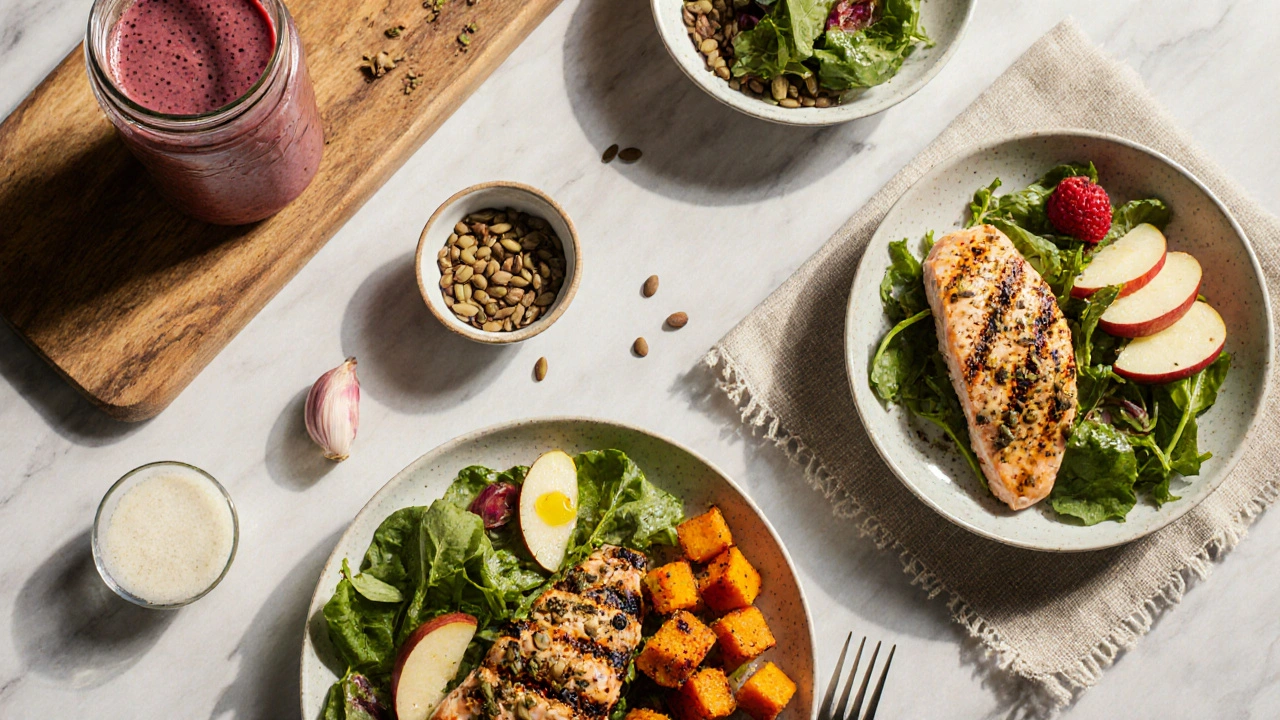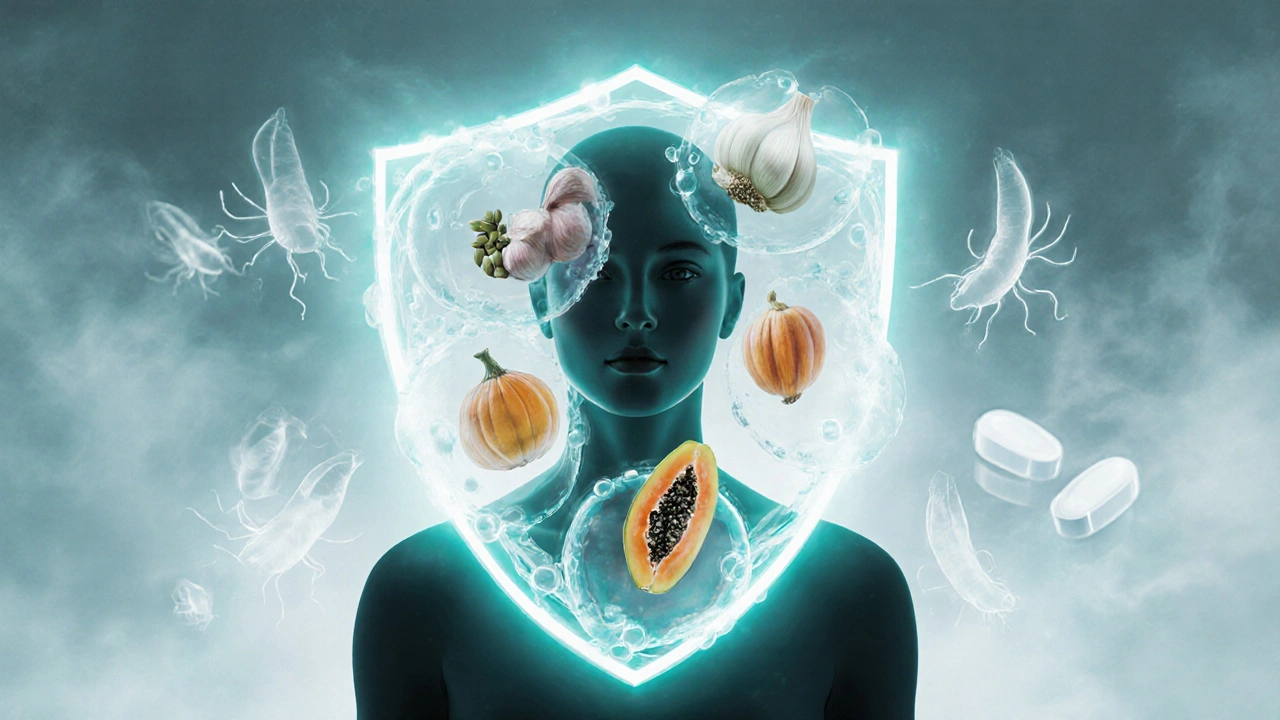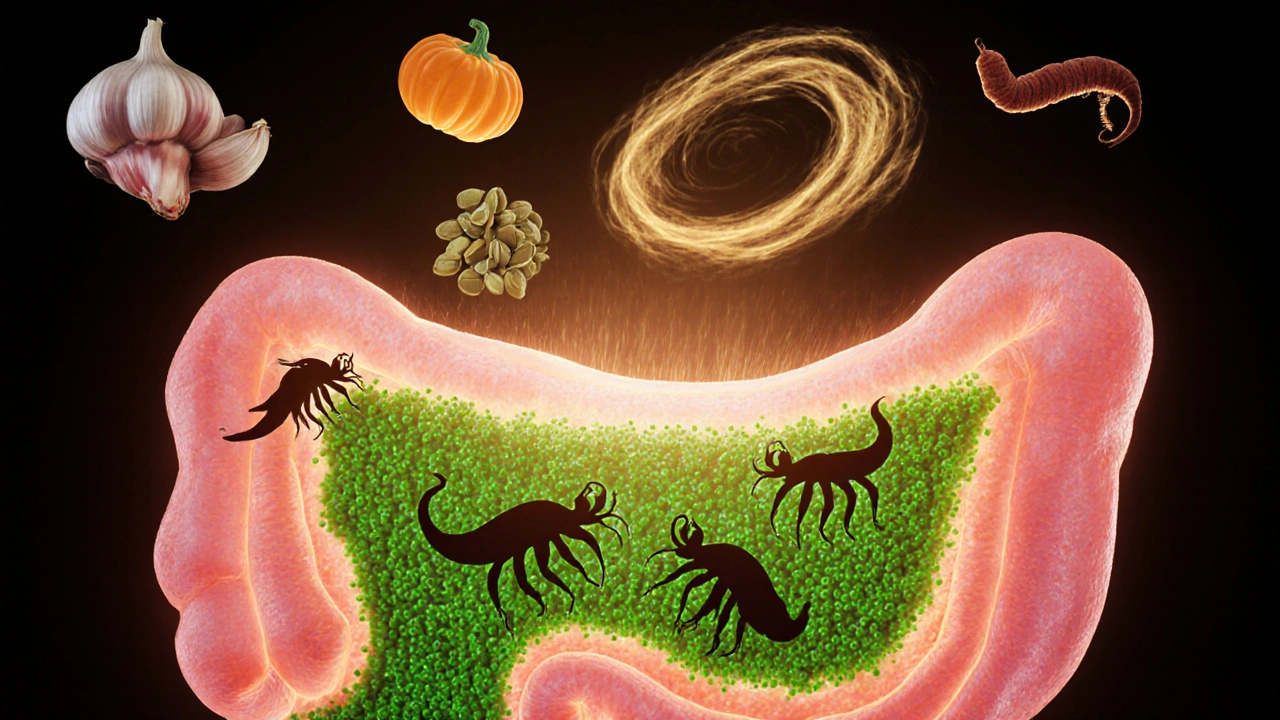Antiparasitic Food Selection Tool
Select one or more antiparasitic foods below to see how they help fight parasites:
Garlic
Allicin
Papaya Seeds
Papain
Pumpkin Seeds
Cucurbitacin
Kefir
Probiotic Strains
Berries
Insoluble Fiber
Sugarcane
Sucrose
Selected Benefits
Select at least one food to see its benefits.
Key Takeaways
- Certain foods boost gut health and immune defenses, making it harder for parasites to take hold.
- Garlic, papaya seeds, pumpkin seeds, and probiotic‑rich items have documented antiparasitic compounds.
- Micronutrients like zinc and vitaminA are essential for a robust immune response to parasites.
- Diet works best alongside proper hygiene and, when needed, prescribed antiparasitic medication.
- Simple meal‑planning tricks can turn everyday cooking into a parasite‑prevention strategy.
What Are Parasitic Infections?
Parasitic infections occur when organisms such as protozoa, helminths, or ectoparasites invade the body, feed on nutrients, and cause symptoms ranging from mild stomach upset to severe organ damage. Common culprits include Giardia, a water‑borne protozoan; hookworm, which burrows into the intestinal wall and steals blood, and Toxoplasma gondii that often spreads through undercooked meat or cat litter.
While medication is the frontline cure, the body’s ability to fight off these invaders depends heavily on nutrition and gut health.
How diet can prevent and treat parasitic infections
Think of your gut as a battlefield. A diverse, fiber‑rich microbiome creates a hostile environment for parasites, while a nutrient‑depleted gut offers easy entry points. The foods you eat influence three key defenses:
- Microbial competition: Beneficial bacteria outcompete parasites for space and food.
- Immune readiness: Vitamins and minerals prime white blood cells to recognize and destroy parasites.
- Physical barriers: Fiber adds bulk, speeding up transit time and flushing organisms out before they embed.
In short, a well‑balanced diet is a collection of foods that supply macronutrients, micronutrients, and bioactive compounds in the right proportions can act as both shield and sword.

Top Antiparasitic Foods and Nutrients
Below are the powerhouse items that research links to lower parasite load.
| Food | Key Antiparasitic Compound | How It Helps |
|---|---|---|
| Garlic contains allicin, a sulfur‑rich molecule | Allicin | Disrupts parasite cell walls and inhibits reproduction. |
| Papaya seeds rich in papain enzyme | Papain | Breaks down protein coatings of cysts, making them vulnerable. |
| Pumpkin seeds contain cucurbitacin | Cucurbitacin | Paralyzes helminths, facilitating expulsion. |
| Fermented kefir source of live probiotics | Probiotic strains (Lactobacillus, Bifidobacterium) | Competes with parasites for attachment sites and produces antimicrobial acids. |
| High‑fiber fruits (apples, berries) | Insoluble fiber | Accelerates intestinal transit, flushing out parasites before they embed. |
| Raw sugarcane high in sucrose | Sucrose | Feeds certain helminths; best limited when parasite risk is high. |
Micronutrients also play a starring role. Zinc a trace mineral essential for immune cell function improves the activity of natural killer cells that hunt parasites. VitaminA, found in carrots and sweet potatoes, maintains the integrity of the intestinal lining, preventing parasites from crossing into the bloodstream.
Sample Meal Plan: Prevention and Support
Here’s a one‑day menu that blends the foods above with balanced macros.
- Breakfast: Smoothie with kefir, frozen berries, a handful of spinach, and a tablespoon of pumpkin seed powder.
- Mid‑morning snack: A raw garlic clove (if tolerated) or a small garlic‑infused hummus.
- Lunch: Grilled chicken salad featuring chopped papaya seeds, sliced apple, mixed greens, and a drizzle of olive oil.
- Side: Steamed broccoli (vitaminC boosts zinc absorption).
- Afternoon snack: Carrot sticks with a zinc‑rich pumpkin seed dip.
- Dinner: Baked salmon (rich in omega‑3s that modulate inflammation) served with quinoa, sautéed garlic, and roasted sweet potatoes.
- Evening beverage: Warm water with a pinch of turmeric (anti‑inflammatory) and a splash of kefir.
Swap proteins for beans or lentils if you’re vegetarian; the antimicrobial compounds stay the same.
Foods to Limit or Avoid
Not every tasty option helps. High‑sugar items, refined carbs, and excessive alcohol can weaken gut flora, giving parasites a foothold.
- Processed snack foods-often low in fiber and high in simple sugars.
- Heavy red meat cooked rare-may contain cysts of Toxoplasma.
- Unpasteurized dairy-can harbor Giardia.
When you’re traveling to regions with known water contamination, stick to boiled or filtered water and avoid raw salads unless you can wash them with safe water.

When Diet Isn’t Enough: Integrating Medical Treatment
Even the best eating plan won’t eradicate an established infection on its own. If you notice persistent diarrhea, abdominal pain, unexplained weight loss, or see parasites in stool, seek medical care.
Typical antiparasitic drugs-metronidazole for Giardia, albendazole for hookworm, or praziquantel for tapeworm-clear the majority of parasites within days. Pairing medication with the dietary strategies above speeds recovery and reduces the chance of reinfection.
Remember: nutrition supports the immune system during drug therapy, helping you bounce back faster and feel better sooner.
Quick FAQ
Frequently Asked Questions
Can I rely solely on food to cure a parasite?
Food can lower the risk and help clear mild infections, but clinically proven medicines are needed for most established parasites.
How much garlic should I eat each day?
One to two fresh cloves, chopped and left to sit for 10 minutes before cooking, delivers enough allicin to have an antiparasitic effect without causing stomach upset.
Are probiotic supplements useful against parasites?
Yes. Strains like Lactobacillus rhamnosus and Bifidobacterium lactis compete with parasites and produce short‑chain fatty acids that make the gut environment hostile.
What role does zinc play in parasite defense?
Zinc boosts the activity of macrophages and natural killer cells, which identify and destroy parasite larvae before they mature.
Is it safe to eat raw papaya seeds daily?
A tablespoon a day is generally safe for most adults; excessive amounts can cause mild digestive irritation.


Ujjwal prakash
October 6, 2025 AT 14:00Garlic is awesome, but chowing down a whole bulb at once can fry your gut!!!
Diane Helene Lalande
October 6, 2025 AT 15:06Adding a handful of pumpkin seeds to your meals boosts zinc intake, which is crucial for white‑blood‑cell activity against parasites. It’s a simple swap that doesn’t require fancy cooking techniques. Feel free to sprinkle them on salads or blend them into smoothies.
Edwin Levita
October 6, 2025 AT 16:13One must appreciate the culinary choreography behind antiparasitic nutrition; it is not merely about tossing garlic into a stew. The synergistic dance between fiber‑rich berries and probiotic‑laden kefir orchestrates a gut environment hostile to encysted ova. While the article lists compounds, it glosses over the kinetic interactions at the mucosal surface. A nuanced regimen would stagger these foods across meals to maintain a constant antimicrobial pressure. Moreover, the timing of vitamin A‑rich sweet potatoes relative to iron‑heavy meats can influence absorption pathways pivotal for immune modulation. Ignoring these subtleties reduces the plan to a checklist rather than a strategic protocol.
Xander Laframboise
October 6, 2025 AT 17:20Sure, pumpkin seeds have zinc, but relying on a sprinkle won’t fix a depleted immune system. You’d need a sustained intake, possibly supplemented, especially if your baseline diet is already low‑fat and low‑protein.
Jason Petersen
October 6, 2025 AT 18:26Garlic does have antimicrobial properties but the dosage matters.
Melissa Gerard
October 6, 2025 AT 19:33All this foodie talk looks like a marketing gimmick 🙄
Cindy Knox
October 6, 2025 AT 20:40Hey, I get why it feels that way, but the science behind allicin isn’t just hype; it actually disrupts parasite cell membranes.
beverly judge
October 6, 2025 AT 21:46When incorporating kefir, choose the plain, unsweetened version to avoid feeding parasites with excess sugars. Start with a quarter‑cup daily and gradually increase as your digestion adapts.
Capt Jack Sparrow
October 6, 2025 AT 22:53Yo, the plain kefir tip is spot on, but also watch out for dairy intolerance – it can backfire and give you more gut issues.
Manju priya
October 7, 2025 AT 00:00Indeed, dairy sensitivity can compromise the probiotic benefits; opting for a lactose‑free fermented drink such as coconut kefir may preserve the microbial boost without the digestive upset 😊
Jesse Groenendaal
October 7, 2025 AT 01:06Most of these food suggestions ignore cultural dietary restrictions and assume everyone can afford exotic items like papaya seeds. Not everyone has access to fresh kefir or pumpkin seeds, especially in low‑income regions where parasite prevalence is highest.
Persephone McNair
October 7, 2025 AT 02:13While socioeconomic variables impact dietary compliance, nutrient‑dense alternatives like fermented soy (tempeh) or locally sourced legumes can deliver comparable probiotic and zinc profiles without the premium cost.
siddharth singh
October 7, 2025 AT 03:20Let me break down why each component of the sample meal plan matters for anti‑parasitic defense.
The kefir‑based breakfast smoothie supplies live cultures that compete with intestinal parasites for adhesion sites and produce lactic acid, lowering the pH to an unfavorable level for many helminths.
Frozen berries contribute insoluble fiber, which not only accelerates transit time but also binds to toxins released by dying parasites, facilitating their excretion.
Spinach adds iron and folate, supporting the proliferation of immune cells that target protozoan cysts.
Pumpkin seed powder introduces cucurbitacin, a compound shown in laboratory studies to paralyze nematodes, making them easier to expel.
Mid‑morning garlic, even a single clove, releases allicin after crushing, a sulfur‑rich molecule that disrupts parasite cell membranes and inhibits enzyme function.
The papaya seed garnish on lunch provides papain, an proteolytic enzyme that digests the protein coat of Giardia cysts, rendering them vulnerable to digestive enzymes.
Apple slices contribute pectin, a soluble fiber that can bind bile acids and help maintain a balanced microbiome, indirectly suppressing parasite growth.
Broccoli’s vitamin C boosts zinc absorption, ensuring that the zinc from pumpkin seeds is effectively utilized by natural killer cells.
Carrot sticks in the afternoon snack supply beta‑carotene, which the body converts to vitamin A, a nutrient essential for maintaining the integrity of the intestinal epithelium.
The pumpkin seed dip not only adds flavor but also reinforces the zinc load introduced earlier, creating a cumulative effect throughout the day.
Dinner’s garlic‑infused salmon pairs omega‑3 fatty acids with antimicrobial spice, attenuating inflammation that could otherwise compromise barrier function.
Sweet potatoes supply additional vitamin A and complex carbs, giving your gut bacteria a steady energy source without feeding parasites.
The warm turmeric‑kefir beverage before bed adds curcumin, which has anti‑inflammatory properties and may further weaken parasite metabolism.
Finally, staying hydrated with boiled water and limiting high‑sugar snacks prevents the creation of a glucose‑rich environment that some parasites exploit for rapid replication.
By spacing these foods across meals, you maintain a continuous stream of antiparasitic compounds, reducing the window of opportunity for any organism to establish a foothold.
Angela Green
October 7, 2025 AT 04:26Great breakdown! Just a heads‑up: “beta‑carotene” should be capitalized as “β‑carotene” when you’re being precise, and “cucurbitacin” is a class of compounds, so saying “cucurbitacin‑type compounds” would be more accurate.
April Malley
October 7, 2025 AT 05:33Thanks for all the detailed tips-feeling more confident about tweaking my diet now! 😊
scott bradshaw
October 7, 2025 AT 06:40Sure, because America’s “miracle diet” will solve everything.
Crystal Price
October 7, 2025 AT 07:46Food is more than fuel; it’s the battleground where we fight unseen enemies, and every bite can be a weapon or a shield.
Murhari Patil
October 7, 2025 AT 08:53Exactly, the elite don’t want you knowing that a simple seed can dismantle the parasites they profit from.